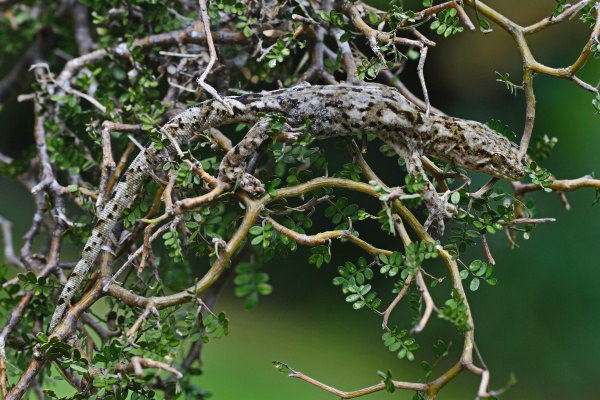Facts About Jewelled gecko
The jewelled gecko is a unique and endangered lizard native exclusively to the South Island of New Zealand. Belonging to the Diplodactylidae family, this gecko is renowned for its vivid colors and intricate patterns, which vary by geographical location. Their diet primarily consists of insects and moths, but they also occasionally consume berries and nectar.
You can identify a jewelled gecko by its vibrant green body decorated with stripes or diamond-like patterns. Markings show color variations, and males and females can be distinguished by the color of their mouth linings and tongues. These geckos can grow up to 18 cm in length, weigh up to 15 grams, and have a lifespan exceeding 40 years.
Due to threats such as habitat destruction, fragmentation, and introduced predators, the jewelled gecko is listed as "Endangered" on the IUCN Red List. New Zealand's Department of Conservation also designates it as "At Risk." Conservation efforts are actively ongoing to protect this remarkable species.
Jewelled geckos are primarily found in the southeastern part of the South Island, especially in the Canterbury and Otago regions. They prefer habitats with woody vegetation, drylands, and shrublands, where they can find both shelter and food. Being arboreal and diurnal, jewelled geckos are often seen in trees and are active during daylight hours.
Jewelled geckos reproduce viviparously, meaning females give birth to live young—typically one or two each year following a gestation period of around seven months. Their reproduction follows a seasonal pattern, with mating and births occurring at specific times of the year.
Their diet includes insects, berries, and occasionally nectar from native plants. The species faces threats from habitat destruction, predators such as rodents and birds, and illegal poaching. The only known parasite affecting the jewelled gecko is the ectoparasite Neotrombicula naultini.
For the Ngāi Tahu people of New Zealand, the jewelled gecko holds cultural significance and is considered a taonga, a highly prized treasure in their culture.
